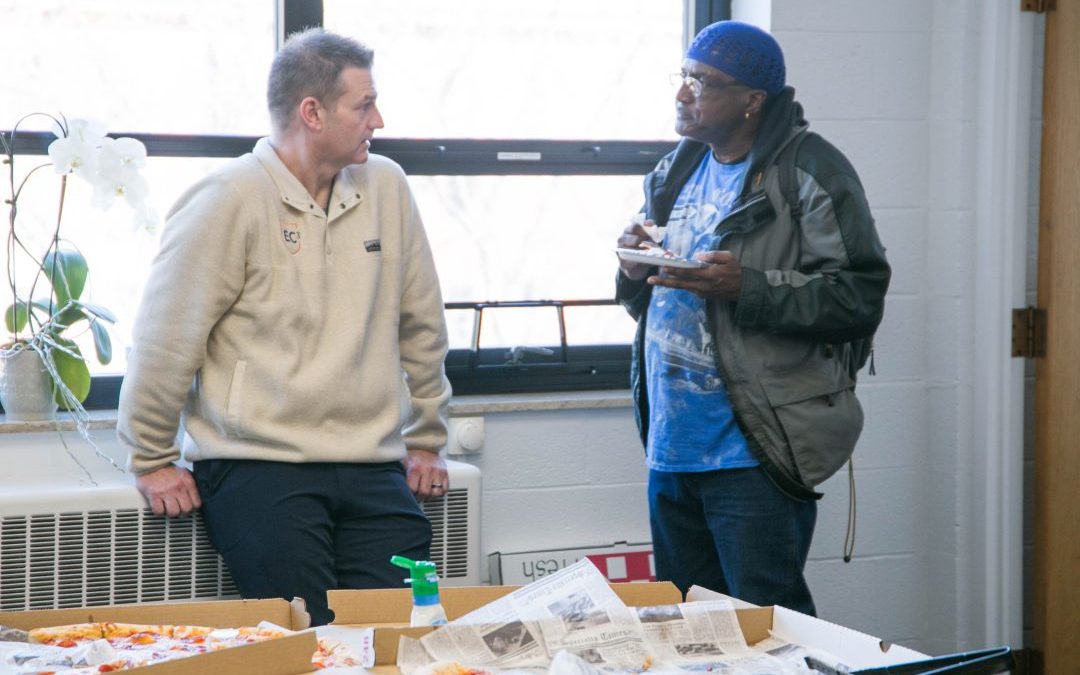Chris Gray, Ph.D.
Founding President, Erie County Community College
Earlier this week, the solar eclipse was the big excitement here in Erie as everyone came together to witness four-ish minutes of totality. This was the last total solar eclipse that will be visible from Erie during many of our lifetimes since the next won’t occur until 2099, and let’s be honest, it’s just a really cool thing to witness! Seeing our students, faculty, and staff get excited about watching this astronomical phenomenon likewise gave me pause. There was a heightened energy in the time leading up to the event. Erie County came together to share the experience which made something that was already exciting just that much better. The atmosphere was just fun and electric!
From the first, one of our EC3 goals has been to establish a true community for our students, an educational family in which all who come to us are welcomed and accepted. This is belongingness in action, and it’s one of EC3’s core values; our mission depends on it. As we just began our last class session of the 2023-2024 year also, it feels like a good time to reflect on what belongingness is and why it still matters.
It’s no secret that college is an incredibly challenging time for students, and it’s not uncommon for them to struggle at some point during their academic career — especially those who are brand new to higher education. Whether it’s academic difficulties, personal issues, or feeling that they don’t belong, it’s essential that we at EC3 have a strong support system in place to help students when they need it most.
Of course, it’s crucial to recognize that student struggles can stem from a variety of sources, so a blanket approach is untenable. Academic challenges, such as difficulty with coursework or test anxiety, can and do cause stress that then impacts students’ academic performance. Personal issues, such as relationship problems or mental health concerns, can also affect students’ ability to focus on their studies. Additionally, a lack of a feeling of connection can lead to feelings of isolation and disconnection from the campus community. All of these are independently detrimental to student success; when they combine, they can be catastrophic.
When students begin to struggle, academic help can be an effective way to provide support; we are so fortunate to have talented faculty dedicated to student success and who are willing to take the extra time to help get students where they need to be. We likewise have a stellar team of advisors ready to help students when their personal struggles impact their performance in the classroom. These interventions, in some ways, feel rather easy. They’re designed to address a known and recurrent hurdle.
Another challenge that is essential to address in supporting student success is the creation AND maintenance of a culture that promotes diversity and belongingness. Research has shown that students who feel a sense of belongingness on campus are more likely to succeed academically and have better mental health outcomes. Additionally, promoting diversity can help students develop a deeper understanding of different cultures and perspectives, which is a crucial aspect of any higher education experience. One way in which this happens is through the recruitment of diverse faculty and staff, all of whom help students see themselves in EC3. We remain steadfast in our commitment to this cause of inclusivity.
As ever, it’s critical that we continue to promote a culture of openness and acceptance when students start to struggle. If we don’t, we risk losing them. This includes investing in an environment where students feel comfortable seeking help when they need it and where staff and faculty are approachable and supportive. We’ve been doing this since EC3’s inception, but it’s easy to get comfortable. It’s easy to think that we’ve checked that box and gotten it done. But that’s exactly where the danger lies; it’s thus incredibly important to remember that, while we stay and grow accustomed to our college culture, it’s all new for some of our students every semester. This is when we must be most vigilant; we must live out our mission and not take it as a given that students know it. As I see our students start to struggle, I make a point to reach out to remind them that their success is our mission. Students need this reminder – as do we all.

